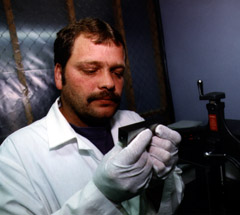|
Rick, 33, tests and calibrates precision mechanical instruments
for Pylon Atlantic in Dartmouth, Nova Scotia. While some companies
specialize in testing particular kinds of instruments, Rick and
the other Pylon technicians are qualified to test a whole range
of instruments - from pressure gauges to potentiometers, and micrometers
to torque wrenches.
Without proper
testing and calibration, there is no way to know if instruments
are accurate, and users can't have any confidence in them. And
that can cause big problems. Rick offers a striking example: "Say
you have a helicopter with a rebuilt engine, and it was all torqued
down with torque wrenches, and one of them wasn't calibrated properly.
Suddenly you have an emergency landing happening because something
is coming loose. All because of a $30 torque wrench that wasn't
calibrated right."
What Rick
likes best about his work is "trying to stay on top of the broad
base of standards we maintain, and knowing the answers to questions
when a customer calls. You read a lot to keep track of what manufacturers
are producing." He says his goal is "to get it so we can measure
everything. That's going to make Pylon a better company and make
our customers stick around longer."
The toughest
part of the job has nothing to do with the workplace, says Rick.
It's "trying to explain to people what I do. They'll say, 'Instrumentation?
Oh, do you fix guitars?'"
|


